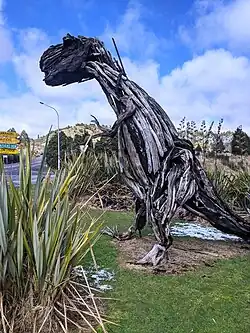Raurimu
Raurimu is a settlement in Ruapehu District, New Zealand. State Highway 4 passes through it, and the North Island Main Trunk railway line runs to the east.[3] The Raurimu Spiral, which allows the railway to climb 139 metres, is described as an engineering masterpiece by the Institute of Professional Engineers of New Zealand.[4]
Raurimu | |
|---|---|
 T-rex sculpture made of driftwood | |
| Coordinates: 39.124°S 175.392°E | |
| Country | New Zealand |
| Region | Manawatū-Whanganui |
| District | Ruapehu District |
| Ward |
|
| Community | Ōwhango-National Park Community |
| Electorate | Rangitīkei |
| Government | |
| • Territorial Authority | Ruapehu District Council |
| • Regional council | Horizons Regional Council |
| Area | |
| • Total | 0.88 km2 (0.34 sq mi) |
| Population (June 2023)[2] | |
| • Total | 70 |
| • Density | 80/km2 (210/sq mi) |
Raurimu railway station served the town from 1906 until its closure in 1978.[5]
A life-size driftwood sculpture of a Tyrannosaurus rex stands at the corner of Keitieke Road and State Highway 4.[6]
Demographics
Raurimu is described by Statistics New Zealand as a rural settlement. It covers 0.88 km2 (0.34 sq mi)[1] and had an estimated population of 70 as of June 2023,[2] with a population density of 80 people per km2. It is part of the larger National Park statistical area.[7]
| Year | Pop. | ±% p.a. |
|---|---|---|
| 2006 | 63 | — |
| 2013 | 63 | +0.00% |
| 2018 | 69 | +1.84% |
| Source: [8] | ||
Raurimu had a population of 69 at the 2018 New Zealand census, an increase of 6 people (9.5%) since the 2013 census, and an increase of 6 people (9.5%) since the 2006 census. There were 27 households, comprising 36 males and 30 females, giving a sex ratio of 1.2 males per female. The median age was 42.9 years (compared with 37.4 years nationally), with 15 people (21.7%) aged under 15 years, 3 (4.3%) aged 15 to 29, 33 (47.8%) aged 30 to 64, and 15 (21.7%) aged 65 or older.
Ethnicities were 95.7% European/Pākehā, 8.7% Māori, and 4.3% Pacific peoples. People may identify with more than one ethnicity.
Although some people chose not to answer the census's question about religious affiliation, 60.9% had no religion, and 34.8% were Christian.
Of those at least 15 years old, 12 (22.2%) people had a bachelor's or higher degree, and 12 (22.2%) people had no formal qualifications. The median income was $28,600, compared with $31,800 nationally. 9 people (16.7%) earned over $70,000 compared to 17.2% nationally. The employment status of those at least 15 was that 27 (50.0%) people were employed full-time, and 9 (16.7%) were part-time.[8]
References
- "ArcGIS Web Application". statsnz.maps.arcgis.com. Retrieved 31 March 2023.
- "Subnational population estimates (RC, SA2), by age and sex, at 30 June 1996-2023 (2023 boundaries)". Statistics New Zealand. Retrieved 25 October 2023. (regional councils); "Subnational population estimates (TA, SA2), by age and sex, at 30 June 1996-2023 (2023 boundaries)". Statistics New Zealand. Retrieved 25 October 2023. (territorial authorities); "Subnational population estimates (urban rural), by age and sex, at 30 June 1996-2023 (2023 boundaries)". Statistics New Zealand. Retrieved 25 October 2023. (urban areas)
- Harriss, Gavin (August 2022). Raurimu, Manawatu-Wanganui (Map). NZ Topo Map.
- "Raurimu Spiral". IPENZ. Archived from the original on 2 August 2012.
- Scoble, Juliet. "Names & Opening & Closing Dates of Railway Stations in New Zealand" (PDF).
- Collis, Ashleigh (4 May 2018). "Making natural art out of driftwood". Horowhenua Chronicle.
- 2018 Census place summary: National Park
- "Statistical area 1 dataset for 2018 Census". Statistics New Zealand. March 2020. 7017609.